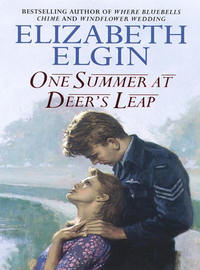
Полная версия
Windflower Wedding
‘What are you drinking, Bill?’ Sam had asked when they had found a place to stand.
‘Heavy, please.’ There was no smile on his tight, rough lips, but there was a smile in his voice.
‘That’s bitter, in Sassenach,’ she heard herself explaining to Sam. ‘And I’ll have a glass of light, please, if that’s okay?’
‘You know your Scottish ales,’ Bill said with Tim’s voice.
And she took a deep breath and said, ‘But of course, hen.’
She hadn’t meant to be flippant, had not meant to use one of Tim’s words because Tim had often called her hen. And you shouldn’t be flippant, should you, when nothing about and around you was real; when all you could be sure of was the voice that wept inside you?
God! Why did you do this? Why did you take Tim away from me then send Bill Benson into my life?
Because Bill was Tim and Tim was Bill. Only sightless eyes and a cruelly burned face disguised them.
She found herself wondering if Bill liked to dance, only to hear a ragged voice whispering in her ear: It doesn’t matter if Bill Benson dances or not. He isn’t Tim. Tim is dead! He will never come back; you know he won’t.
She was grateful that Sam returned at that moment, carrying three glasses on a tin tray.
‘Y’know, Tatiana – there’s one good thing about being a wounded hero! You get served first!’
She took a glass, then said, ‘Bill,’ and he turned in the direction of her voice. ‘Your drink …’
He held out his hand and she arranged his fingers round the glass, then said, ‘Cheers!’ even though his hands had not been burned and could have almost been the hands that once touched and gentled her body.
Did you hear me, God? Why …?
Keth tapped on the door and pushed it open.
‘Hullo, sir. Come for your homework?’ asked the pleasant-faced ATS corporal.
‘Please. But tell me, Corporal, why are all the army girls around here sergeants but you?’
He felt pleased that his voice sounded so normal.
‘Because I’m not old enough. You have to be twenty-one in this setup. Only three months to wait!’
She looked very young; certainly not twenty and three-quarters. He wondered how much she knew; how far she was trusted, until she turned the dial on the safe to the left and right, then handed him a folder marked ‘237’.
‘This is yours, Captain. Will you sign for it, please?’ There was a docket stapled to the front of it and she wrote the date, the day and the time on it then offered it for his signature. ‘And will you sign the office copy, too?’
‘You look very young to be working in a setup like this.’ Keth initialled the second copy. ‘Do you find it a strain?’
‘No, sir. My own choice entirely. I wanted, initially, to be sent out into the field, but –’
‘Work for SOE, you mean? An agent?’
‘I work for SOE now,’ she smiled. ‘But yes, one day I’d like to go to France.’
‘But why?’ She was too young, too pretty, too vulnerable-looking.
‘For the same reasons as yourself, I suppose.’
‘Hey! Don’t get any ideas about me! I’m here because I made a bargain. I owe them one – and I suppose I’m going because I know more about – well –’ he faltered, ‘I’m going because I know more than most about what this particular trip entails. I’m certainly not going because I like danger, or anything like that. I want to get it over and done with, then settle into my boring routine again. And get married,’ he added, almost as an afterthought. Which was stupid, really, because he had become Gaston Martin only because he so desperately wanted to marry Daisy. ‘And should we be talking like this, Corporal?’ he asked more severely than he intended to. ‘What I mean is – well – will our conversation be reported to Himself in authority?’
‘No, sir,’ she said softly. ‘Not by me it won’t.’
‘Thank you.’ He smiled, relieved. ‘But tell me why someone like you should want to go on active service with SOE? Working here you must surely know what it entails?’
‘Yes, I do. But I love France, you see. All the special things in my life happened there. We went there a lot before the war, on holiday and every year to the same pension. I learned to swim in France when I was four. France was a happy place for me and my brother.
‘Then my parents sent me to school there, to finish me off, as they called it. I went when I was sixteen. When I came home for my seventeenth birthday they wouldn’t let me go back; they thought we’d soon be at war, you see, and home was the safest place to be. I’ve been trying to get back ever since.’
‘A young man?’
‘Partly,’ she said, without even the hint of a blush. ‘There was someone I was fond of, but his letters stopped. I suppose I’d be happy just to know what has happened to him – if he is still alive. But really, I just want to go back to France. Can you understand?’
‘Yes, I can,’ he said softly, knowing they shouldn’t be talking so intimately and that probably the place had hidden microphones. ‘But do you think –?’ His eyes swept the walls and ceiling.
‘They might be listening in?’
‘Nothing would surprise me here.’
‘No. This room is all right.’
‘But not Room 22?’
‘I didn’t say that. And, sir – can you go there now? They said I was to tell you.’
‘I’m on my way. ’Bye, Corporal.’
‘Goodbye, sir.’
He closed the door softly, walking slowly across the bare, echoing hall, turning left towards the staircase. He should have asked her name, he supposed; would have, had he even remotely imagined she would give it to him.
But how could she want to stick her neck out – walk headlong into danger; or be parachuted into it, or flown into it, or go there by submarine?
Because she loved France, she said and because there had once been someone special there. It was, he supposed, why Keth Purvis was about to do something equally stupid. Because he loved Daisy. Love, he supposed, was the most powerful motivator of all – unless it was hate.
He knocked twice on the door of Room 22 and a voice called to him to enter.
Reaching for the ornate iron door handle, he wondered how much more he would know by the time he left.
7
Keth lolled in the armchair, feet straddled, legs stiffly outstretched, and glowered at the pile of clothes on his bed and the cheap suitcase at the foot of it.
He was annoyed. Damned annoyed. With himself, but most of all with the slab-faced stranger who had made him a laughing stock. Because not only, it seemed, was he an idiot when it came to parachuting; now he had gone one better.
Half an hour ago he had acted – or was it reacted? – like an absolute fool and all because Slab Face had caught him unawares.
He jumped to his feet and strode to the window, kicking out childishly at the case as he passed it. One lock on it was broken. He would have to tie it round with string, he supposed.
He stared moodily across the grounds to the dense pinewood beyond. The clothes on the bed were all secondhand and he wondered if they had been washed. Did they have jumble sales in France and did SOE send a bod over regularly to buy up old clothes?
But he was being childish, not entirely because of what had happened in Room 22, but because, if he were completely honest, this stupid, what-the-hell-am-I-doing-here mood of bewilderment was because he was afraid. He had always been afraid, only now was the first time he’d admitted it.
In Room 22 he’d been greeted with a nod by the civilian with whom he’d drunk brandy last night. The stranger who sat behind the desk – the one with the face like a concrete slab – had not even nodded, indicating with a frugal movement of his hand that Keth should sit in the chair facing.
‘We will conduct this interview in French, Captain. Name?’
That had been the start of it.
‘Gaston Martin.’
‘Age?’
‘Twenty-five.’ Easy. Just two months younger than himself. ‘Born the third of September.’ That was easy, too. The day war started.
‘Mother?’
‘Belle.’
‘Father?’
‘Jules Martin. Killed 1917.’
The questioning was rapid; his answers without fault. He let himself relax because his French was better in every way than that of his interrogator whose French was too perfect, too correct. Parisian French. Learned at university, no doubt. But Keth Purvis spoke the language with mam’selle’s Normandy accent; used her clichés and her colloquialisms and she had told him his pronunciation was almost perfect.
That was when his complacency was shattered.
‘Mon capitaine!’
Keth had turned his head sharply in the direction of the voice, his guard completely down, to gaze across the room, eyes questioning. That was when it happened.
The blow to his face caught him unawares. He turned, startled, knocking over his chair as he lunged across the desk.
‘What the hell!’ He grabbed at the coat lapels with angry hands, heaving the man to his feet. ‘What was that in aid of?’
Slab Face did not reply. Still shaking with anger, Keth hissed ‘Tell me!’ at his brandy-drinking companion, who shrugged without even moving his position.
‘I’ll tell you!’ With a practised move, the interrogator freed himself from Keth’s grasp, then delivered a chopping blow to his shoulder that sent him reeling across the room to fall, legs in air, near the door.
‘Get up, Captain,’ the voice drawled and because apart from being reluctant to continue the conversation from floor level, Keth needed to look his tormentor in the eyes; calmly, and without wavering, and listen to the offered explanation. Slowly he rose, dusting his sleeve, pulling straight his jacket. Then he took three steps to stand in front of the desk, jaws clamped tight.
‘All right! I’m listening!’
‘Sit down, please.’ A command, not an invitation. ‘So, Captain Purvis …’
‘Why?’ Keth demanded, all at once realizing his cheek throbbed painfully and wondering how soon it would show bruising.
‘Drink?’
‘Thank you, sir, no.’
Without moving a muscle of his face the man turned to the table behind him and poured from a decanter. Then he sat down, sighed, and said, ‘Why did I hit you? So shall we take it that you, an Englishman in German-occupied France and posing as a native, is asked for his papers by a passing patrol – which often happens, I might add – and something prompted the corporal in charge of that patrol to take you in for – er – questioning. Just a routine arrest to let his superiors know he was doing his job efficiently.
‘Let us say that I was the young, zealous officer who asked questions of you – perhaps, like the corporal who brought you in, a little overzealous because I had no wish to be sent to the Russian Front. And I would have to admit that you seemed genuine. Your answers were correct, though not too readily offered; your whole attitude, I might have thought, was entirely that of Gaston Martin.’
Keth waited unspeaking.
‘Then I, who might have been a Gestapo officer, slapped your face, unexpectedly and seemingly without reason. And not only did you let your guard down, but you reacted exactly as your interrogator hoped you would. It’s the oldest trick in the book and you signed your own death warrant when you fell for it!’
‘Yes, but dammit, how was I to know? Wouldn’t you, I mean?’
‘You mean, dammit wouldn’t I have been annoyed, too, and the answer is yes, I would! But a Frenchman – Gaston Martin – would have called him all kinds of a pig, in French, maybe even spat in his face. Yet you, mon brave, reacted in English! One sudden slap, and your cover is blown!’
‘Okay. So I know now. It won’t happen again.’
‘It had better not. In this line of business, second chances aren’t very thick on the ground.’ The man with the face like a concrete slab emptied his glass, then left the room without a sideways glance at either of those remaining.
There was silence as the door closed softly and they listened to the unhurried tread of receding footsteps.
‘There’s a name for people like him!’ Keth muttered to his companion of the previous evening.
‘There is.’ The unknown, unnamed man who wore civilian clothes and poured generous brandies allowed himself a small smile. ‘But one day you might have reason to be grateful to the miserable bastard for saving your life. So how about a quick one before lunch? I’d like you to eat with me in my office. There are a few things to go over before you leave.’
Keth almost demanded to know when, exactly, but his new-found, painfully acquired caution warned him to wait.
‘Thanks, sir. I’d like that.’
He had tried to smile but could not, because his heart was hammering still, though whether from anger, or the sudden realization that even an unimportant operative could not close his eyes to what could happen, he did not know. In this setup, he was forced to admit, there were no milk runs and even the most straightforward in-and-out job was no piece of cake.
Now, in his room, he turned from the window and stared again at the neatly folded clothes; clothes, he supposed, that those in charge of such things would expect a French labourer to wear: well-worn trousers, a jacket and shirt, collar attached. Brown shoes which looked as if they would fit – he hadn’t tried them on yet – and a raincoat.
He snapped open the one good lock on the case to find underwear – none of it new but clean, at least – a pair of working trousers, overalls and a cap. He’d have bet on a beret, though he was now prepared to admit that the people here knew what they were about.
To complete Gaston Martin’s worldly goods were two towels and a spongebag – even that looked used – and inside the bag a razor, shaving soap, a toothbrush – new! – and a cake of dentifrice in a silver-coloured tin.
Before he left he would be given a cheap, French-made watch and franc notes and coins. Not too many, of course, because labourers weren’t expected to carry a lot of money. Gaston Martin probably lived from job to job within the boundaries of his work permit and what was left over from the purchase of his strictly rationed food, he would doubtless spend on wine. Red wine, Keth decided.
He made a note to ask more about his ration card. His food-ration documents bothered him almost as much as his claustrophopic mode of transport to an isolated inlet north of Biarritz.
He found himself wishing he had been allowed to bring a photograph of Daisy because in his present state of perplexity he found he could not bring her face into his mind’s eye, nor hear her voice nor her laugh at will. Something to do with shock, he supposed, or apprehension, or a mix of both. All he could remember was the way her hair slipped through his fingers and the feel of her lips on his. Her face, though, and her voice were gone from his rememberings. What a mess. What a damn-awful mess!
He reached for his cap and slammed shut the door of his room behind him. He needed to walk. He would walk around and around the grounds until some perplexed sentry asked him what he was about. And when he was tired of walking, he would write to his mother and again to Daisy; tell her how much he loved her and wanted her. Hell, how he wanted her!
Briefly he returned the salute of the sentry on the garden door, then stuffing his hands into his trouser pockets in a most unsoldierly way, began to walk along the crunching, gravelled paths in the direction of the distant hills, wondering just how near to them he would get before being stopped.
What was Daisy doing now? His diary was at Castle McLeish so he had lost track of her watches. The wireless was freely available here, so he was fairly sure there had been no air raids on either Liverpool or London.
He kicked out at a stone on the short-cut grass beside the path, trying yet again to bring Daisy’s face, her smile, into focus. But she remained elusive, so he straightened his shoulders, set his arms at an easy swing, and began to walk the boundaries of the grounds.
So he was nervous and apprehensive, but who in his right mind wouldn’t be? He was a mathematician, a back-room boy. He was a breaker of codes and not one iota brave. Not for him flying a bomber over Germany in the blackout; not for him prowling the seas in a submarine nor dropping out of a plane at the end of a parachute. He was lucky that he knew his limitations and being brave – foolhardy – was not one of them.
So he was going to occupied France and knew now where he would be put ashore and that he would be picked up and hidden away until he was needed. He was not being asked to take undue risks. Even the Enigma machine would be brought to him by some foolish brave man – or woman. Then he would be brought out again with the precious package and if he couldn’t do something as uncomplicated as that for Daisy; do it, even, for the merchant seamen who risked their lives every time they left port, then it was a poor lookout.
Wherever you are, my darling, he whispered with his heart, it’s going to be all right for us. I’m all kinds of a fool, but we will be married on my next leave and nothing on the face of the earth will stop us because I love you, love you!
It was then that it all came right and he was able to recall her smile, hear the softness of her voice as she whispered that she loved him too; that she would always love him and yes, they would be married. Very soon.
It was at times like this, he insisted as he walked briskly back to the forbidding stone house that was forbidding no longer, that he had to believe. But believe in who, or what? In God, perhaps; in miracles? On this early October afternoon he needed to believe in miracles and yes, in God too. It was all down, he supposed, to loving Daisy so much and if conditions meant taking a calculated risk, then she was worth it.
He was going to France and coming safely back! Oh, too damn right he was!
‘So how did things go, last night?’ Sparrow demanded as they cleared the table after supper. She was downright curious if only because Tatiana had volunteered nothing on her return from the theatre – except that the music had been lovely.
‘Just fine,’ Tatiana shrugged.
‘And you didn’t get yourself upset?’
‘Of course not. Why should I?’
‘No reason at all – except that you are upset! Is it the new one – the blind one? Did you find it all too much?’
‘No, Sparrow. Oh, no.’
‘Then tell me.’ She filled the bowl with water then added a fist of washing soda. ‘Because the first time you took an airman out you were full of it, and wanted to go on helping Joannie’s lot.’
‘And I still want to.’ Tatiana watched, fascinated, as the older woman lathered a block of primrose soap into a sud. ‘I really do. It was just that – well, it all seemed so spooky. Not spooky-frightening but spooky-strange, sort of. And rather nice.’
Sparrow continued her lathering without comment, agitating the water into bubbles.
‘You see, Sparrow, I’m trying to tell myself that something wonderful hasn’t happened – and it has. I told you about Tim?’
‘Y-yes.’
‘Well last night it wasn’t Tim, exactly. He was called Bill Benson. And he was Scottish and just about Tim’s height. And he had fair hair, too, and –’
‘And he was an air-gunner, like your Tim was?’
‘Yes.’ She picked up a plate, drying it ponderously. ‘It threw me, at first.’
For just a little while it had been too much to accept. It got so out of hand that in the dimness of the theatre, when Bill leaned close to whisper to her, he sounded so much like Tim she had wanted to get away; push past everyone, run out and never go back.
‘So now you’re going to pretend it’s your young man come back to you with his face burned?’
‘No, Sparrow! Don’t say that! It’s cruel!’
‘It’s fact, girl, and you’re being morbid! Your young man hasn’t come back. The one you took to the theatre last night wasn’t Tim. And I’m not being cruel about their poor faces. Far from it. I think they should all have a medal, Lord love them! But don’t get entangled, Tatiana. Your mother put you in my care and I won’t have you getting yourself upset all over again. And maybe this Bill has a young lady – maybe even a wife. Did you think to ask?’
‘I didn’t, Sparrow, because it isn’t important,’ she said softly, though she knew as soon as she spoke that it was important because she was so certain in her dreamings that the young man who sat beside her had some part of Tim in him, that she had wanted to reach for his hand, entwine her fingers in his, just as she and Tim always did in the intimate, shoulder-to-shoulder darkness of Creesby picture house. Would have, only a voice, very much like Sparrow’s, had called a warning, and she was forced to tell herself it was not Tim who sat beside her and that even to think such a thing was being unfaithful to his memory.
But for just a moment, until she regained control of her feelings, Tim had not died in a crashed bomber on Holdenby Pike. Tim survived, dreadfully burned and blinded, too, her foolish heart insisted, and had come back with a different name. And even his name was uncanny. Tim Thomson. Bill Benson. Even the cadence was there.
‘Well, if it isn’t important, you’ll maybe stop trying to rub the pattern orf that plate and shift yourself so we’ll be done in time to listen to Tommy Handley! And maybe it’d be better if our Joannie sent you someone different next time.’
‘No!’ She said it much, much too quickly. ‘I mean – well, I promised Bill and Sam I’d see them both again next week. We got on well together the three of us, and Sam is such a help with Bill. I couldn’t go back on my word, Sparrow. Not the word of a Sutton.’
‘Well, if you say so. Only don’t go filling your head with day dreams or you’ll get hurt again – especially if he’s married. And there was a letter for you from Liverpool. I left it on the hall table. Did you see it?’
Sparrow knew Daisy’s handwriting; had known Daisy since she was a little thing in her mother’s arms, and living in Hampshire.
‘Sorry – I didn’t look, actually. I’ll read it later. And don’t worry about me, Sparrow – though I’m glad, really, that you do. It was just that meeting Bill Benson last night was a bit of shock, that’s all. I’m fine now. It’s all under control. I know what I’m doing.’
But did she know what she was doing, she thought that night as she lay snug and cosseted in bed and thought about Tim Thomson and Bill Benson. Because she didn’t know what she was doing if she were scrupulously honest, and to say she did was like spitting into the wind, which was a very unladylike thing to do – apart from being messy!
She turned over with an exaggerated sigh, then plumped up her pillows. Frightening though that meeting had been, she knew there could never, ever, be another man in her life after Tim. And that was a pity, really, because never to be able to fall in love again was a terrible thing to have to accept; like becoming a nun and not being able to go back on your word.
But those three wonderful months she and Tim spent together were worth a lifetime of being alone. Indeed she was, she thought, very lucky to have met Tim at all. If she hadn’t gone to the dance at Holdenby Moor aerodrome she would never have have known the joy of loving completely and being completely loved in return.
She smiled softly and sadly and said good night to Tim as she always did, then made her mind a blank, because she must not think about Bill Benson. Perhaps Sparrow was right and Joannie should ask some other volunteer to take him out on the town.
Trouble was, she had promised, and anyway, next week she would most probably wonder why she had ever thought Bill Benson was in the least like Tim. There could never be another Tim Thomson. Not ever. It was as simple – and awful – as that.
Drew and Kitty leaned against the landing-stage railings, thighs touching, hands clasped, gazing across the river to the Cheshire side. Sharp against the skyline the jagged outlines of bombed buildings were gentled by a setting sun that scattered the river with a sparkle of rubies.







